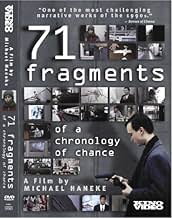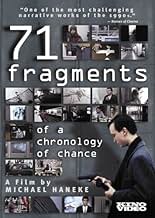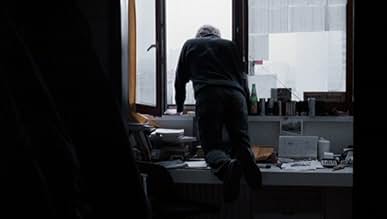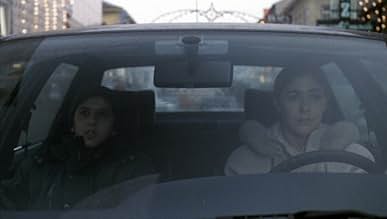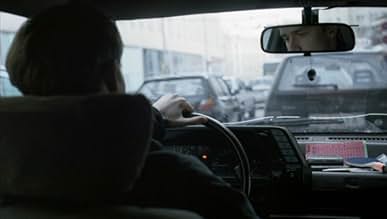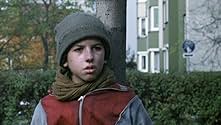71 fragmentos de una cronología del azar
Título original: 71 Fragmente einer Chronologie des Zufalls
PUNTUACIÓN EN IMDb
7,1/10
9,3 mil
TU PUNTUACIÓN
Añade un argumento en tu idioma71 scenes revolving around a recent immigrant, a couple that has just adopted a daughter, a college student and a lonely old man.71 scenes revolving around a recent immigrant, a couple that has just adopted a daughter, a college student and a lonely old man.71 scenes revolving around a recent immigrant, a couple that has just adopted a daughter, a college student and a lonely old man.
- Dirección
- Guión
- Reparto principal
- Premios
- 4 premios y 1 nominación en total
Michael Jackson
- Self
- (metraje de archivo)
- (sin acreditar)
Reseñas destacadas
A Sample film in 90's about violence and how it improves. Pazzle-like narration with 71 episodes, shows us a story about the history of violence. "71 Fragmente einer Chronologie des Zufalls" has all the signs of a film which could be made in 90's. Haneke is one of the contemporary filmmaker who use the violence scenes to show us how this huge question (why violence?) has no straight answer. 71... is almost look like another haneke's famous film (Code unknown,2000) which both of them are narrating unfinished stories of some journeys. Unexpected final scenes and also, unexpected shocking shots are two icons in this film like another Haneke's films. Haneke's style is like the way Robert bresson made films. Bresson's cinematograph and also Hitchcock's suspense are affected in his cinema. His cinema invites us to watch untold stories about complicated questions of contemporary world.
Before Austrian film director Michael Haneke got well-recognized and appreciated in the international film circuit with such films as "Code Unknown", "Time of the Wolf" and "The Piano Teacher" (all of which were made in France and shown in Cannes), he already made his mark with a number of films made in his native Austria, one of which is this film called "71 Fragments of a Chronology of Chance"(1994). This work is the third installment in the director's "glaciation trilogy" (the other two being "The Seventh Continent" and "Benny's Video"), thus called because of the central theme of the fine line between barbarism and civility in modern urban life being completely, hopelessly blurred. The "barrier" has been broken, so to speak.
As the title suggests, the film consists of 71 "fragments" or vignettes, seemingly random, unrelated and mundane, of various characters going through the motions and vagaries of daily existence in urban Austria. But one can sense that this only seems to be so, as the film's prologue suggests that this is the event that will loom over the succeeding "fragments". And that is, the 1993 Christmas Eve reckless shooting done by a 19-year-old student named only as Maximillian B. inside a bank and on the streets, before eventually shooting himselfone that is purportedly based on a real-life incident.
No explanations or back-stories are provided to the characters and their situations being shown "episodically" on the screen (a Romanian boy refugee, a bank delivery man, an old pensioner, a childless couple and, of course, the student himself). More often than not, a specific fragment is abruptly interrupted or ended by a black fade-out (an alienating technique Haneke once again utilized in the equally visceral and demanding "Code Unknown"). Some fragments happen for not more than a minute, while some last for as long as five or even eight minutes (notably the scene where the student practices ping-pong tennis facing an automated opponent and the scene where the old pensioner argues with his daughter over the phone, both of which vividly displaying a whole gamut of simmering emotions without ever resorting to histrionics). Even reinforcing the clinical, cold approachfor which Haneke is really knownis the utter lack of an accompanying soundtrack and the wordlessness of some scenes.
The sense of dread is punctuated by the ever-present television (as is the case in the two other films in the trilogy), from where a specific world news is being broadcast (like the ethnic war in Somalia and the child abuse charges against pop star Michael Jackson). This is as if to suggest that the looming event foreboded at the film's start is itself to become a subject of a TV news coverage which, albeit small in scale when compared to the news indicated above, is nevertheless not without a lasting cost to the human lives involved, physically, emotionally and psychologically. Having said this, how has the line separating civility and barbarism come to be completely violated in this thought-provoking film?
The trigger shooting perpetrated by the young student, which serves to be the film's denouement, appears to have been done for no apparent reason at all. It's senseless killing in its purest meaning (which arguably is the underlying essence of the middle-class family's suicide in "The Seventh Continent" and the teenage boy's videotaped murder of the girl in "Benny's Video"). And this is what makes the act all the more chilling. It's as if to suggest that such a self-destructive act is inherent in everyone of us, if not what makes up our essence, waiting only to be brought to the surface by a seemingly random and inconsequential spate of events (in "71 Fragments'" case, it's to be rooted in the student's lack of enough cash to pay for his car gas).
And when the "event" does finally happen, rather than to serve as an important food-for-thought, it's sadly reduced to no more than a piece of media sensation, regarded as the hot "news of the day", focusing more on "what" happened than on "why" did it happen. The alarming incident thus becomes another piece of media entertainment, to be savored by mass consumers who always crave for what is sensational and controversial, without ever thinking of its deep-rooted incitations and implications. (This is a thought which Haneke is to delve full-blown in "Funny Games", both the Austrian and American versions, though I really prefer the first one.)
If in Polish auteur Krzysztof Kieslowski's world, chance incidents and fateful encounters are all part of a grand design to convey deep layers of human emotional truths (like in the truly majestic "Three Colors" trilogy), in Haneke's (or at least in the world of "71 Fragments"), such randomness is to be put in order by an inherent barbarism that's only barely creeping out of the human psyche.
As the title suggests, the film consists of 71 "fragments" or vignettes, seemingly random, unrelated and mundane, of various characters going through the motions and vagaries of daily existence in urban Austria. But one can sense that this only seems to be so, as the film's prologue suggests that this is the event that will loom over the succeeding "fragments". And that is, the 1993 Christmas Eve reckless shooting done by a 19-year-old student named only as Maximillian B. inside a bank and on the streets, before eventually shooting himselfone that is purportedly based on a real-life incident.
No explanations or back-stories are provided to the characters and their situations being shown "episodically" on the screen (a Romanian boy refugee, a bank delivery man, an old pensioner, a childless couple and, of course, the student himself). More often than not, a specific fragment is abruptly interrupted or ended by a black fade-out (an alienating technique Haneke once again utilized in the equally visceral and demanding "Code Unknown"). Some fragments happen for not more than a minute, while some last for as long as five or even eight minutes (notably the scene where the student practices ping-pong tennis facing an automated opponent and the scene where the old pensioner argues with his daughter over the phone, both of which vividly displaying a whole gamut of simmering emotions without ever resorting to histrionics). Even reinforcing the clinical, cold approachfor which Haneke is really knownis the utter lack of an accompanying soundtrack and the wordlessness of some scenes.
The sense of dread is punctuated by the ever-present television (as is the case in the two other films in the trilogy), from where a specific world news is being broadcast (like the ethnic war in Somalia and the child abuse charges against pop star Michael Jackson). This is as if to suggest that the looming event foreboded at the film's start is itself to become a subject of a TV news coverage which, albeit small in scale when compared to the news indicated above, is nevertheless not without a lasting cost to the human lives involved, physically, emotionally and psychologically. Having said this, how has the line separating civility and barbarism come to be completely violated in this thought-provoking film?
The trigger shooting perpetrated by the young student, which serves to be the film's denouement, appears to have been done for no apparent reason at all. It's senseless killing in its purest meaning (which arguably is the underlying essence of the middle-class family's suicide in "The Seventh Continent" and the teenage boy's videotaped murder of the girl in "Benny's Video"). And this is what makes the act all the more chilling. It's as if to suggest that such a self-destructive act is inherent in everyone of us, if not what makes up our essence, waiting only to be brought to the surface by a seemingly random and inconsequential spate of events (in "71 Fragments'" case, it's to be rooted in the student's lack of enough cash to pay for his car gas).
And when the "event" does finally happen, rather than to serve as an important food-for-thought, it's sadly reduced to no more than a piece of media sensation, regarded as the hot "news of the day", focusing more on "what" happened than on "why" did it happen. The alarming incident thus becomes another piece of media entertainment, to be savored by mass consumers who always crave for what is sensational and controversial, without ever thinking of its deep-rooted incitations and implications. (This is a thought which Haneke is to delve full-blown in "Funny Games", both the Austrian and American versions, though I really prefer the first one.)
If in Polish auteur Krzysztof Kieslowski's world, chance incidents and fateful encounters are all part of a grand design to convey deep layers of human emotional truths (like in the truly majestic "Three Colors" trilogy), in Haneke's (or at least in the world of "71 Fragments"), such randomness is to be put in order by an inherent barbarism that's only barely creeping out of the human psyche.
After watching Der Siebente Kontinent and Benny's Video in rather rapid succession, it took me an inexplicably long time to get around to this, the third in Michael Haneke's Glaciation Trilogy, the director's exploration of isolation and alienation in modern society.
Following the unrelated stories of an array of everyday Austrians, 71 Fragmente einer Chronologie des Zufalls explores the weeks immediately before a bank shooting that leaves four, including the gunman, dead.
A written introduction tells us the eventual outcome of the film's events, leading us immediately to conclude that the climactic crescendo to which we will build is not so much the film's subject as a means by which to explain it. What follows is a ninety minute procession of apparently unrelated stories unfolding before us, detailing the lives of everyday people. From a lonely old man to a couple fostering an aloof child, a border hopping street urchin to an austere and religious security guard and his wife, the film covers many lives and relationships. The transitions between these are marked by a black screen, with occasional footage of news stories interjected throughout. These show us the chaos and anarchy of the characters' world, bitesize glimpses into everyday horrors. Perhaps the only discernible thing connecting them is the mire of insanity which occupies their television screens, something best remembered for later. Each miniature story is compelling and interesting, a fine achievement given the limited screen time each gets with such an array of characters to be explored. Some, of course, engender more interest than others, the old man and student characters two which I found myself particularly drawn to. Haneke, unsurprisingly, constructs long and unconventional shots, beautiful in their individuality. An early morning ritual scene recalls Der Siebente Kontinent, the camera's focus on actions rather than faces an important technique in establishing the life of this particular family. A long and winding scene featuring the elderly man on the phone to his daughter is, though entirely banal and mundane, one of the film's strongest moments, its ability to so simply yet comprehensively detail a character quite wonderful. Though one might argue that the film appears to go in no clear direction for most of its running time, this is a clear part of its slowly unfolding eventual plan. It is only in the last ten minutes of the film that we see anything more than a fly-on-the-wall documentary of regular lives and are introduced to the film's true message: one that is impactful, subtle, and the perfect finale for a trilogy that delightfully explores its chosen theme.
Creating portraits of a wide number of characters, each more intimate than many films' main characters, 71 Fragmente einer Chronologie des Zufalls is a very fine final act in a very fine trilogy. Just as subtle, removed, and non-judgmental as its predecessors, this is a comprehensive and thought-provoking social commentary which will doubtlessly benefit from multiple viewings, perhaps even more so than its cinematic siblings.
Following the unrelated stories of an array of everyday Austrians, 71 Fragmente einer Chronologie des Zufalls explores the weeks immediately before a bank shooting that leaves four, including the gunman, dead.
A written introduction tells us the eventual outcome of the film's events, leading us immediately to conclude that the climactic crescendo to which we will build is not so much the film's subject as a means by which to explain it. What follows is a ninety minute procession of apparently unrelated stories unfolding before us, detailing the lives of everyday people. From a lonely old man to a couple fostering an aloof child, a border hopping street urchin to an austere and religious security guard and his wife, the film covers many lives and relationships. The transitions between these are marked by a black screen, with occasional footage of news stories interjected throughout. These show us the chaos and anarchy of the characters' world, bitesize glimpses into everyday horrors. Perhaps the only discernible thing connecting them is the mire of insanity which occupies their television screens, something best remembered for later. Each miniature story is compelling and interesting, a fine achievement given the limited screen time each gets with such an array of characters to be explored. Some, of course, engender more interest than others, the old man and student characters two which I found myself particularly drawn to. Haneke, unsurprisingly, constructs long and unconventional shots, beautiful in their individuality. An early morning ritual scene recalls Der Siebente Kontinent, the camera's focus on actions rather than faces an important technique in establishing the life of this particular family. A long and winding scene featuring the elderly man on the phone to his daughter is, though entirely banal and mundane, one of the film's strongest moments, its ability to so simply yet comprehensively detail a character quite wonderful. Though one might argue that the film appears to go in no clear direction for most of its running time, this is a clear part of its slowly unfolding eventual plan. It is only in the last ten minutes of the film that we see anything more than a fly-on-the-wall documentary of regular lives and are introduced to the film's true message: one that is impactful, subtle, and the perfect finale for a trilogy that delightfully explores its chosen theme.
Creating portraits of a wide number of characters, each more intimate than many films' main characters, 71 Fragmente einer Chronologie des Zufalls is a very fine final act in a very fine trilogy. Just as subtle, removed, and non-judgmental as its predecessors, this is a comprehensive and thought-provoking social commentary which will doubtlessly benefit from multiple viewings, perhaps even more so than its cinematic siblings.
Mr. Michael Haneke begs the audience to start asking the important questions.
The film begins with a text of a news item involving a bank shooting incident in Vienna a day before Christmas eve 1993 that left three people dead with the 19-year-old assailant later found to have shot himself nearby.
What then follows is a series news broadcasts interspersed with scenes involving seemingly random characters while they go through their day-to-day existence: a Romanian refugee who illegally entered Austria seeking asylum, a soldier, an armored van security guard, a college student, a couple having trying to adopt a kid, and elderly man and his bank employee daughter.
The film is, as the title indicates (and I'll take the filmmaker's word on that), there are a total of "71 fragments" divided into segments that are separated by almost three seconds of black frames. I actually took trouble counting those (because I don't have a life) and found out that--
The different characters are shown going through mundane activities throughout the film and it gives the viewers an insight to human behaviour and the dynamic between the characters whose connection to the other charcters are more evident than some. They are also seen to be watching these same news broadcasts in their respective environments apart from the segments that solely featured these news items being played on-screen, which in a way connects almost every person in this film.
Mr. Haneke has a style all to his own. He's a master in evoking fright without necessarily having to show much, this will be apparent near the end of the film, the Haneke genius I'd say, just as gruesome. This is not one of his best work but it stands out on its own for the always-relevant commentary that he wishes to expound.
The narrative that Mr. Haneke wanted to express could only be realized through a closer scrutiny of the various fragments which eventually points to a far greater tragedy, and he also throws in a fair warning as well. The same thing could also can be said regarding the conflicts around the world. We see the news on TV, the horrific images, the drama, yet something is lacking. What were the events that led up to the tragic outcome that we all get to witness on the screen? Clearly, there are some people who know more than others and the news reporters seem not to be able to get to those people for some reason or another, it is this incompleteness that kind of detaches us, the viewers, from the horror, and there are people taking advantage of other people's silence and rendering them just as complicit to those acts of violence.
My rating: A-minus.
The film begins with a text of a news item involving a bank shooting incident in Vienna a day before Christmas eve 1993 that left three people dead with the 19-year-old assailant later found to have shot himself nearby.
What then follows is a series news broadcasts interspersed with scenes involving seemingly random characters while they go through their day-to-day existence: a Romanian refugee who illegally entered Austria seeking asylum, a soldier, an armored van security guard, a college student, a couple having trying to adopt a kid, and elderly man and his bank employee daughter.
The film is, as the title indicates (and I'll take the filmmaker's word on that), there are a total of "71 fragments" divided into segments that are separated by almost three seconds of black frames. I actually took trouble counting those (because I don't have a life) and found out that--
The different characters are shown going through mundane activities throughout the film and it gives the viewers an insight to human behaviour and the dynamic between the characters whose connection to the other charcters are more evident than some. They are also seen to be watching these same news broadcasts in their respective environments apart from the segments that solely featured these news items being played on-screen, which in a way connects almost every person in this film.
Mr. Haneke has a style all to his own. He's a master in evoking fright without necessarily having to show much, this will be apparent near the end of the film, the Haneke genius I'd say, just as gruesome. This is not one of his best work but it stands out on its own for the always-relevant commentary that he wishes to expound.
The narrative that Mr. Haneke wanted to express could only be realized through a closer scrutiny of the various fragments which eventually points to a far greater tragedy, and he also throws in a fair warning as well. The same thing could also can be said regarding the conflicts around the world. We see the news on TV, the horrific images, the drama, yet something is lacking. What were the events that led up to the tragic outcome that we all get to witness on the screen? Clearly, there are some people who know more than others and the news reporters seem not to be able to get to those people for some reason or another, it is this incompleteness that kind of detaches us, the viewers, from the horror, and there are people taking advantage of other people's silence and rendering them just as complicit to those acts of violence.
My rating: A-minus.
If you're looking for something happy, uplifting, and fun then steer clear of this movie. If you're looking for something easy and simple then steer clear of this movie. If you're looking for something that you can watch with half a brain then avoid this movie like the plague. 71 Fragments of a Chronology of Chance is an experimental film from visionary mastermind Michael Haneke. The film is 71 different scenes that highlight small tidbits of the lives a seemingly random collection of people. News clips of war and Michael Jackson are spliced into the film as well, creating a disjointed and difficult narrative that in some ways all ties together, but in other ways stays loose and frivolous. The interpretation of this kind of narrative style is at the viewers discretion.
If you're at all familiar with Haneke's work then you'll know not to expect anything straightforward going into this film. If you go into this film knowing nothing about Haneke then may God have mercy on your soul. Not really, just be prepared. This is not an easy film to follow being that there seems to not be much to follow. The majority of the film spends its time laying down the various puzzle pieces with very little rhyme or reason to the distribution of the pieces. Towards the end of the film the pieces begin coming together for a fairly anticlimactic ending that reflects the perpetual sadness of a world full of violence, hardship, neglect, and hatred. You'll never miss Haneke's macabre cynicism in any of this films, and especially not this one.
It's difficult for me to form a steadfast opinion on this film because it is so out there and so difficult to fully comprehend. As always, I respect Michael Haneke for the being the true genius he is. He's created something wholly original and intuitive here, I just can't quite place what it is. There are a lot of lines going in different directions here and they never seem quite seem to meet up. This film challenges the ideas of your typical film narrative and I have to give it kudos for taking such risks and ending up with something that works more or less. 71 Fragments of a Chronology of Chance isn't a film you just watch, it's something you experience.
If you're at all familiar with Haneke's work then you'll know not to expect anything straightforward going into this film. If you go into this film knowing nothing about Haneke then may God have mercy on your soul. Not really, just be prepared. This is not an easy film to follow being that there seems to not be much to follow. The majority of the film spends its time laying down the various puzzle pieces with very little rhyme or reason to the distribution of the pieces. Towards the end of the film the pieces begin coming together for a fairly anticlimactic ending that reflects the perpetual sadness of a world full of violence, hardship, neglect, and hatred. You'll never miss Haneke's macabre cynicism in any of this films, and especially not this one.
It's difficult for me to form a steadfast opinion on this film because it is so out there and so difficult to fully comprehend. As always, I respect Michael Haneke for the being the true genius he is. He's created something wholly original and intuitive here, I just can't quite place what it is. There are a lot of lines going in different directions here and they never seem quite seem to meet up. This film challenges the ideas of your typical film narrative and I have to give it kudos for taking such risks and ending up with something that works more or less. 71 Fragments of a Chronology of Chance isn't a film you just watch, it's something you experience.
¿Sabías que...?
- CuriosidadesFilm debut of Sebastian Stan.
- PifiasWhen Tomek (Otto Grünmandl) makes himself dinner, around the 20 minutes mark, there's a mirror in the background that reflects the boom mic.
- ConexionesFeatured in Mein Leben: Michael Haneke (2009)
Selecciones populares
Inicia sesión para calificar y añadir a tu lista para recibir recomendaciones personalizadas
- How long is 71 Fragments of a Chronology of Chance?Con tecnología de Alexa
Detalles
- Fecha de lanzamiento
- Países de origen
- Idiomas
- Títulos en diferentes países
- 71 Fragments of a Chronology of Chance
- Localizaciones del rodaje
- Empresas productoras
- Ver más compañías en los créditos en IMDbPro
- Duración1 hora 40 minutos
- Color
- Relación de aspecto
- 1.66 : 1
Contribuir a esta página
Sugerir un cambio o añadir el contenido que falta

Principal laguna de datos
By what name was 71 fragmentos de una cronología del azar (1994) officially released in India in English?
Responde
